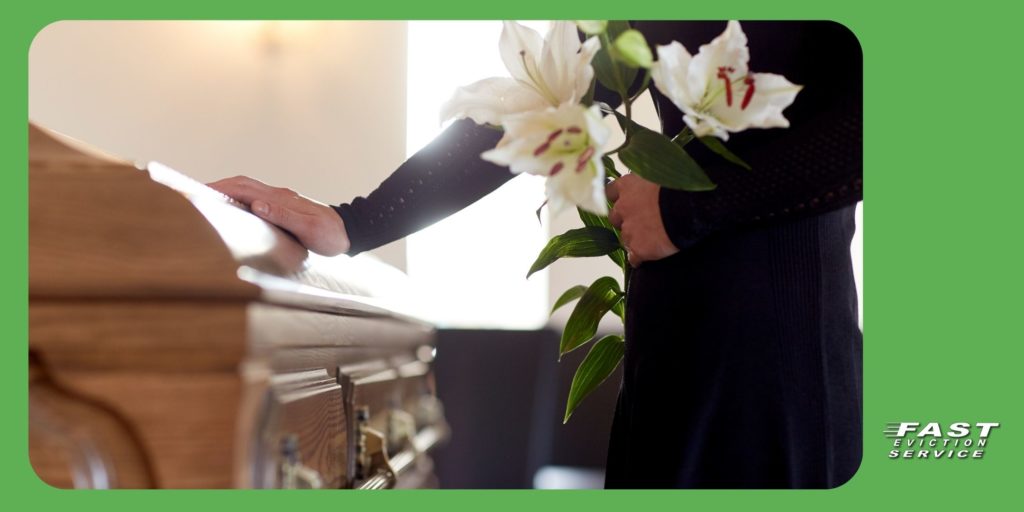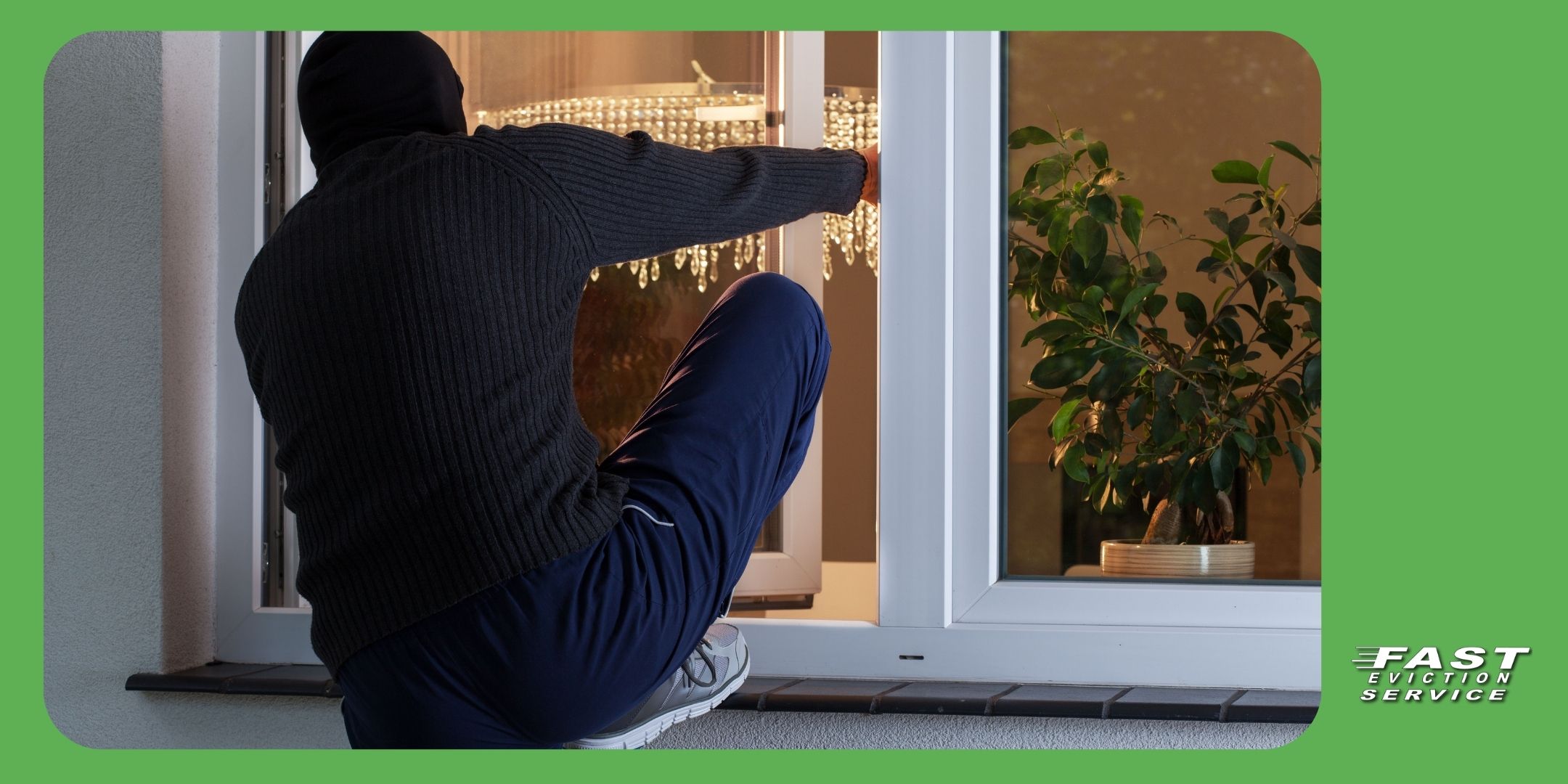Updated 12/12/24
Death is a difficult subject for all of us to talk about. Dealing with family members or loved ones who are grieving is especially delicate and difficult.
Any landlord who has had to deal with the death of a tenant knows this can be a major disruption of a landlord’s income depending upon the circumstances of the death and if they were on a month-to-month or fix term lease.
First and foremost, it’s important to understand that the death does not terminate the tenancy. It’s crucial to be respectful of the dead person’s loved ones – but at the same time take steps to protect yourself until an executor is named.
The landlord is responsible for protecting the tenant’s property just as if they were alive until that responsibility can be transferred to an executor. It’s essential to know and follow the laws carefully or potentially end up in lawsuits and delays in recovering possession of your rental property ready to be rented again.

How the Death Occurred
The landlord will usually find out about a tenant death in one of two ways. Either you will be contacted by the tenant’s family, or the body will be discovered on the property.
If the body is discovered on the property contact the police immediately. Leave everything on the scene untouched for the police investigation. They will take responsibility for contacting next of kin, which is usually the emergency contact information the landlord possess that the tenant provided with the rental agreement.
In a worst-case situation, the body was in the rental unit for several days before it is discovered and the stench of putrefaction can give off a powerful and overwhelming smell. This odor will permeate everything in the unit and will require extensive professional cleaning by a biohazard specialist – as well as time – to go away and enable it to be rentable again.
It’s highly unlikely you will be able to find another tenant to rent it until the smell is gone. How long that will take is hard to predict. This unpredictability has bearing if the tenant was on a fix term lease and time is needed through the entire lease period for the smell to go away and rent continued to be paid by the tenant’s estate.
If the death was the result of a homicide, the landlord could be facing days, weeks even months of police investigations to complete. Legal counsel should be sought to get it expedited as quickly as possible.
Landlord Responsibilities
The fixed term lease or month-to-month rental agreement is not terminated automatically as a result of the death. The landlord does not have the legal right to reposes the property or remove the tenant’s possessions.
The landlord does have the right, and most would say the responsibility to secure the property locking all doors and windows and changing locks if local laws allow that in these circumstances. Crucial to understand that this is the most important way for a landlord to protect themselves from relatives saying valuables were removed.
Related: Dealing with burglary on your rental property.
Because there is usually a lapse of time between the death is known and the executor or the tenant’s estate is named by the court it is at the landlord’s discretion who is given access during this period.
This responsibility is usually sprung upon the executor unexpectedly. So, it can usually take some time coming up to speed attending to all the details this responsibility suddenly entails. That should be expected, but can also delay the process of the landlord repossessing the rental.
It is natural and should be expected for family members to want to come to the property and recover things of sentimental value like photographs to be used in a memorial. However, its very important for the landlord to protect themselves and avoid becoming embroiled in family disputes in how they permit access or allow property to be removed before an executor is named and has taken possession of the rental by giving them the key.
It’s a sad fact of life that many families break up dividing up property after a death. People may not be thinking straight grieving, or have selfish opportunistic motives.
Until the executor has possession of the key, the landlord has a responsibility to prevent illegal entry to the property. However, this can be a very difficult time for people close to the deceased and its important for the landlord to be flexible if possible for example, for items to be removed for a memorial of the deceased.
If their request sounds reasonable and you want to allow them entry, always accompany the family members who ask for access. A full accounting with a list and ideally photographs makes a clear record who took what. Entry is at the landlord’s discretion until the executor has the key.
If pets are left on the property, animal control can be called.
Once the court names an executor – and be sure you see proof of executor status – give that person the key. They then have responsibility for access until the lease agreement ends or is terminated. This then becomes the person the landlord deals with regarding rental payments and removal of personal property.
Length of Remaining Tenancy
In California, if the tenant was on a month-to-month the tenancy terminates 30 days after their death. The estate is responsible for paying any rent through the end of the 30-day period after notice of death is received.
It becomes more complicated with long term leases. Under California Law, the executor is responsible for paying rent through the remainder of the lease period.
However, most executors want to end the payments as soon as possible, and most landlords want to get the unit rented out again. In this circumstance, its best to try to work with the executor and treat the situation like a broken lease agreement where the estate is responsible for rent until the landlord is able to clear, clean and re-rent the property.
Its important to be clear and provide a letter to the family stating the duration of the tenancy so they know how long they have to empty the rental space.
Security Deposit
The security deposit may go towards rent, property damage and cleaning costs. If the cleaning deposit was not enough to cover the unexpected costs of cleanup after a death in the unit, provide the executor with a detailed list of expenditures and submit a claim to the estate through the probate court. If a portion of the security deposit is left over, a check can be sent to the executor for the amount made out to “The Estate of Deceased’s Name”.
Related: Can Landlords Charge Renters for Repairs if They Do the Repairs Themselves?
Once the property is cleared and cleaned, the landlord should ask for a “release to the rights of possession” letter. Once that is received, the landlord is then able to re-rent the property.
What if No Executor is Named?
This is a difficult situation for the landlord. Just because the next of kin may not be known, they could potentially show up three years from now wanting to know, “Where is my relative’s diamond ring?” In this circumstance it’s crucial for the landlord to protect themselves and act in full compliance with California Civil Code – CIV § 1951.3 regarding abandonment of property.
If the property goes unclaimed and the personal items are valued at less than $700, the landlord may dispose of the property. If the value of the personal items are $700 or more, the landlord must sell the items at a public auction in California. The funds from the auction can be used to pay for storage of the property and the remaining funds must be sent to the County where the rental unit is located.
If the tenant is dead and no longer paying rent, eviction is also a possibility to regain possession of the property. However, this is an expensive process.
Three Year Rule
Under California Civil Code § 1710.2, for the next three years if asked, the landlord must disclose to any prospective tenant who views the property that a previous tenant died there. The landlord is required to explain the circumstances of how the person died unless the death was HIV/AIDS related. If a tenant died of AIDS or related illnesses, the landlord does not have to disclose the tenant’s medical condition at the time of death.
Related: Top 15 Landlord Tax Deductions
Conclusion
Knowing a California landlord’s responsibilities and potential liabilities to avoid mistakes is key to being prepared for this unfortunate but inevitable reality.
While the landlord of course wants to regain their property and square accounts for any losses, its important to remember the family is grieving and probably have little or no experience handling an estate. This takes patience on the part of the landlord to best handle what is inherently a very difficult situation and avoid doing anything that can make it worse for everyone involved.
Frequently Asked Questions
Who has access to apartment after death?
The landlord should only grant access to a court-ordered executor.
Does a lease terminate at the death of a tenant?
Not automatically. The landlord must work with the executor to terminate a fixed lease or terminate a month to month tenancy.
Who is responsible for cleaning out the rental after death of a tenant?
The landlord can use the security deposit amount to hire a cleaning company or clean the apartment themselves.
What happens when a tenant dies in California?
Typically, the tenant’s appointed executor will handle negotiations with the landlord regarding security deposit, unpaid rent, etc. Once the executor deals with the deceased tenant’s personal property, the landlord receives the release to the rights of possession letter, they can put the rental property back ion the market.







